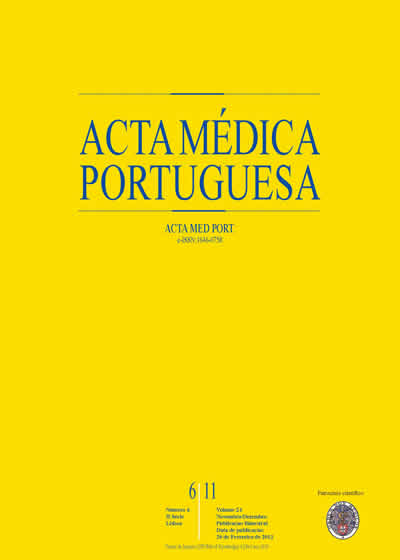Venous thromboembolism risk factors and practices of prophylaxis: ENDORSE study results in Portugal.
DOI:
https://doi.org/10.20344/amp.1420Abstract
Venous thromboembolism (VTE) risk assessment is a cornerstone for the achievement of best practices and outcomes. Epidemiologic data and practices related to venous thromboprophylaxis as considered by the global ENDORSE study, (Epidemiologic International Day for the Evaluation of Patients at Risk for Venous Thromboembolism in the Acute Hospital Care Setting), enrolled 68,183 patients from 32 countries, in which Portugal. Within ENDORSE, data from all participant countries analyzed to determine their risk of VTE and to evaluate the suitability of prophylaxis.European patients were enrolled from randomly selected hospitals in Portugal (European Hospital Register), according to ENDORSE study inclusion/exclusion criteria. The Seventh ACCP evidence-based consensus guidelines were employed to evaluate VTE risk and prophylaxis use.From a total of 3,145 beds assessed, 2,183 were considered eligible and 1,632 met all criteria. Of these, 860 (52.7%; 95% CI 50.3-55.1) were at risk of VTE: 525 surgical patients (68.9%; 95% CI 65.5-72.1) and 335 medical patients (38.5%; 95% CI 35.3-41.2). The rate of prophylaxis according to ACCP guidelines in overall patients at risk was 58.5% (503 patients). The prophylaxis rate for VTE was 59% (310 patients) in surgical patients and 57.6% (n=193) in medical patients. 39.7% of surgical patients and 39.4 % of medical patients who did not meet the criteria for prophylaxis were also on prophylaxis with an anticoagulant, which was considered to be inappropriate.More than a half of these hospitalized patients in Portugal were deemed at risk of VTE and less than two-thirds of them received appropriate prophylaxis. New strategies are required for implementation of venous thromboprophylaxis in Portuguese hospitals.Downloads
Downloads
Published
How to Cite
Issue
Section
License
All the articles published in the AMP are open access and comply with the requirements of funding agencies or academic institutions. The AMP is governed by the terms of the Creative Commons ‘Attribution – Non-Commercial Use - (CC-BY-NC)’ license, regarding the use by third parties.
It is the author’s responsibility to obtain approval for the reproduction of figures, tables, etc. from other publications.
Upon acceptance of an article for publication, the authors will be asked to complete the ICMJE “Copyright Liability and Copyright Sharing Statement “(http://www.actamedicaportuguesa.com/info/AMP-NormasPublicacao.pdf) and the “Declaration of Potential Conflicts of Interest” (http:// www.icmje.org/conflicts-of-interest). An e-mail will be sent to the corresponding author to acknowledge receipt of the manuscript.
After publication, the authors are authorised to make their articles available in repositories of their institutions of origin, as long as they always mention where they were published and according to the Creative Commons license.









